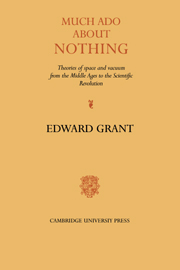 Much Ado about Nothing
Much Ado about Nothing Book contents
- Frontmatter
- Contents
- Preface
- Part I Intracosmic space
- Part II Infinite void space beyond the world
- 5 The historical roots of the medieval concept of an infinite, extracosmic void space
- 6 Late medieval conceptions of extracosmic (“imaginary”) void space
- 7 Extracosmic, infinite void space in sixteenth- and seventeenth-century scholastic thought
- 8 Infinite space in nonscholastic thought during the sixteenth and seventeenth centuries
- Part III Summary and reflections
- Notes
- Bibliography
- Index
6 - Late medieval conceptions of extracosmic (“imaginary”) void space
Published online by Cambridge University Press: 07 October 2011
- Frontmatter
- Contents
- Preface
- Part I Intracosmic space
- Part II Infinite void space beyond the world
- 5 The historical roots of the medieval concept of an infinite, extracosmic void space
- 6 Late medieval conceptions of extracosmic (“imaginary”) void space
- 7 Extracosmic, infinite void space in sixteenth- and seventeenth-century scholastic thought
- 8 Infinite space in nonscholastic thought during the sixteenth and seventeenth centuries
- Part III Summary and reflections
- Notes
- Bibliography
- Index
Summary
With perhaps a few minor exceptions, there was little serious discussion of the possibility of extracosmic void prior to the Condemnation of 1277. When the problem did arise, Aristotle's rejection was usually adopted with little elaboration, as in the anonymous Liber sex principiorum, falsely ascribed to Gilbertus Porretanus; in Johannes de Sacrobosco's Sphere; and in Robert Grosseteste's Commentary on the Physics. Even Thomas Aquinas found little occasion to discuss the possibility seriously, perhaps because he thought extracosmic void an untenable suggestion.
After 1277, however, the situation altered dramatically and the possibility of the existence of extracosmic space came to be discussed in two interrelated, though distinguishable, contexts. In the first context, the primary concern was with the possible existence of void space independent of God but assumed to have been created by Him before, during, or after the creation of the world. The possibility that God could create finite vacua at will was regularly conceded after 1277, though His ability to make an infinite vacuum was, as will be seen, seriously questioned. In the second context, extracosmic void space was not assumed independent of God but was conceived to be in some sense associated, as a property or attribute, with God's omnipresent immensity. Although not all discussions of extracosmic void can be fitted neatly into one or the other of these two contexts – Jean de Ripa's treatment of the subject, for example, seemed to fall into both – it is convenient to consider them separately.
Information
- Type
- Chapter
- Information
- Much Ado about NothingTheories of Space and Vacuum from the Middle Ages to the Scientific Revolution, pp. 116 - 147Publisher: Cambridge University PressPrint publication year: 1981